What is Personalized Customer Service? The Ultimate Guide
Personalized customer service is integral to providing an exceptional customer experience. Now deliver support that exceeds expectations and maximizes satisfaction.

Personalized customer service is integral to providing an exceptional customer experience. Now deliver support that exceeds expectations and maximizes satisfaction.

Delivering exceptional customer support is no longer just a choice; it’s a necessity. Customers crave personalized customer support experiences that cater to their unique needs and preferences.
The expectation of personalization in customer service is higher than ever before, creating an even greater challenge for businesses to deliver on. Do you know that more than 54% of customers expect their experiences to be personalized when interacting with any brand?
Businesses must streamline and customize their customer service communication channels. Personalized customer support has gained significant popularity as it helps businesses achieve better results from customer relationships and build brand loyalty
Personalized customer service refers to customizing the customer experiences per individual customers’ specific needs, preferences and expectations. It involves understanding customer preferences, leveraging customer data and delivering customized support.
Businesses are required to treat customers as unique individuals and provide tailored solutions that resonate with their circumstances. It involves going beyond generic approaches to deliver personalized attention, recommendations, and support that resonate with each customer personally.
Its objectives are:
The following are the benefits of personalized customer service and how it can revolutionize the way businesses engage with their audience.
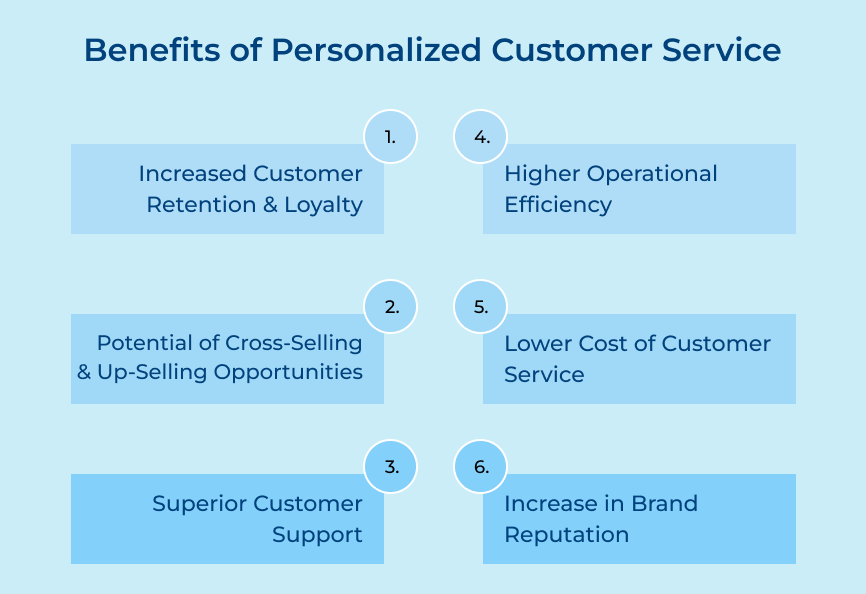
Establishing personal customer service facilitates strong customer relationships and persuades them to remain loyal to your brand. Delivering excellent customer service cultivates customer loyalty and fuels positive word-of-mouth, increasing the likelihood of repeat business.
Offering personalized service reduces the chance of a one-time transaction and increases the potential for cross-selling as well as upselling. It also allows you to suggest related product features or services that may benefit customer needs.
Personalized customer support creates an environment where customers feel comfortable asking questions, receive helpful advice and ultimately develop loyalty toward your brand. The personal customer service provided is always superior and better in the long run.
Companies can efficiently serve their customers through personalized customer service strategies using tools such as omnichannel support platforms or chatbot solutions. It will save company resources and provide a better overall customer experience.
Focusing more on automated systems like AI technologies instead of relying solely on human personnel lowers customer care costs considerably. It still provides excellent customer service experiences through predictive analytics and sentiment analysis.
When users experience personalized customer interaction from a particular company, their inclination to return for future purchases significantly rises. The heightened customer loyalty bolsters the brand’s long-term reputation, solidifying its position in the market.
Below are the effective personalized customer service tips that can transform your customer interactions and propel your business to new heights.
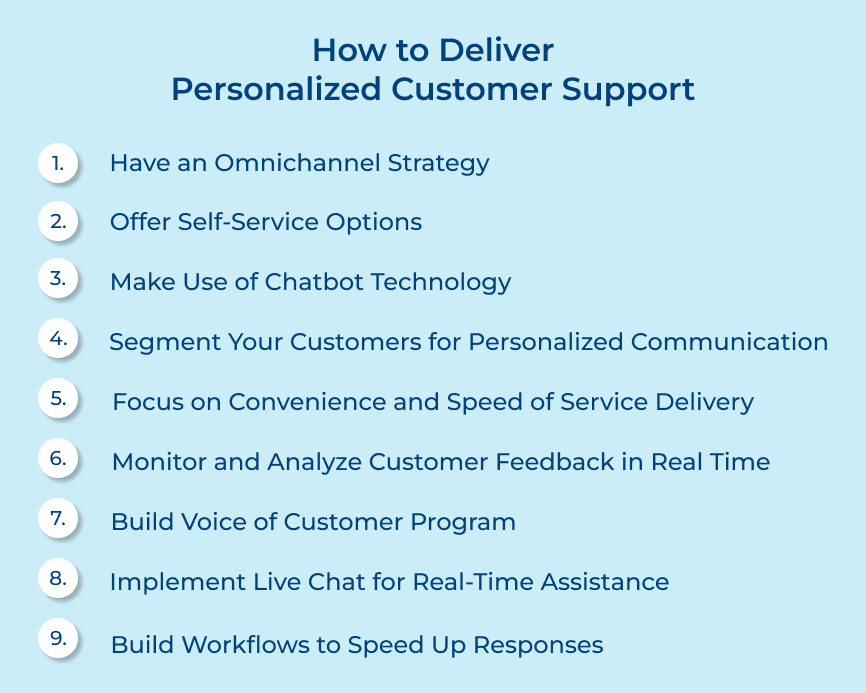
An omnichannel strategy to deliver personalized service is essential for all businesses. Regardless of the preferred communication channel, it ensures that customers receive exceptional experiences and consistent service throughout their journey.
Embracing an omnichannel framework enhances customer satisfaction and strengthens brand loyalty by delivering memorable interactions across all touchpoints. The omnichannel strategy will also give you a better understanding of your customers’ needs and desires.
Actionable Tips:
Automation and self-service options enable your organization to create a seamless online support system that enhances the customer experience while saving valuable time and resources. The empowering approach enables customers to swiftly and effortlessly find answers to their inquiries, providing them with satisfaction.
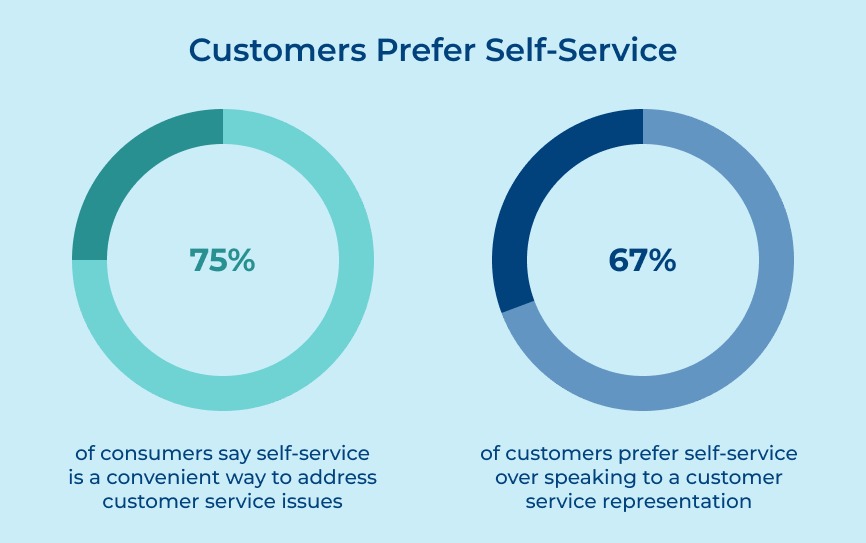
It enables them to dictate the when and how of their interactions with your company’s representatives. The self-service resources enhance customer satisfaction and boost loyalty, as customers feel heard.
Actionable Tips:
Chatbot technology has become increasingly popular in customer support 74% of internet users prefer using chatbots when looking for answers to simple questions. Chatbots enable businesses to offer customers more accurate and relevant answers quickly as well as efficiently to support their services.
Incorporating chatbot technology into Customer Relationship Management (CRM) tools can take service personalization in customer service to the next level. It helps initiate conversations based on customers’ preferences and provides targeted content.
Actionable Tips:
Segmenting customers is an effective way to reach them with personalization in customer service. Tailor your support communications to your customers’ needs, interests and preferences. You can create custom messages for different customer types and send them at the right times.
The tailored approach helps you deliver an enriched customer experience, which leads to higher satisfaction levels and increases customer loyalty over time. You can anticipate and fulfill the distinct needs of every customer, ensuring a personalized experience that leaves them feeling valued and attended to.
Actionable Tips:
Companies must prioritize convenience and speed of service delivery to deliver exceptional support. When customers receive assistance that meets the convenience needs of their times, locations, and personalities, they will likely take full advantage of your business.
Satisfied customers reflect that your customer loyalty and brand awareness have improved. Prioritizing the convenience and speed of service delivery enables the creation of profound connections with the customer base.
Actionable Tips:
Understanding customer feedback in real-time is essential for providing them with personalized customer service. Customer feedback enables your business to respond quickly to customer needs and preferences. You can uncover and respond to issues early on while they are still manageable.
Monitoring and analyzing customer interactions with your products, services, or support processes allows you to drive impactful improvements to enhance the overall customer experience (CX).
Actionable Tips:
A Voice of Customer (VOC) program is designed to capture customer feedback and insight to deliver more personalized, effective customer support. Companies gain valuable insights into the wants and needs of their customer base through data collection. It helps them design better customer experiences that are both enjoyable and effective.
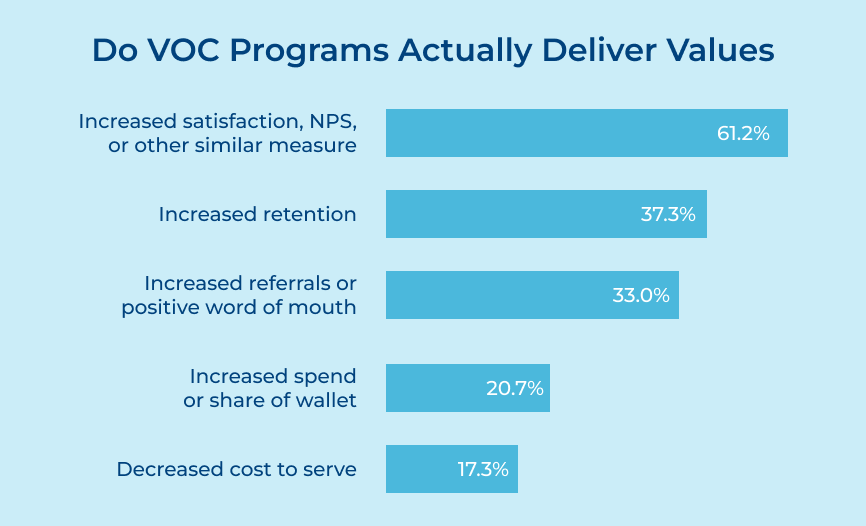
The VOC programs also help companies identify customer pain points early on, which can reduce customer dissatisfaction and save costs in the long run. The benefits of implementing a VOC program will ultimately depend on the willingness of the company to use the insights generated from these programs.
Actionable Tips:
The Implementation of live chat is a great way to provide personalized customer assistance. In addition to reducing costs linked to conventional customer service channels, active customer service communication facilitates instant access to customer inquiries and concerns.
Live chat is quite effective at strengthening customer relationships by promptly addressing their needs while delivering personalized support services. Customers don’t feel like they are talking to a bot; it creates an interactive environment where conversations can flow naturally between the customer and service provider.
Actionable Tips:
Automated workflows can help to streamline customer service and enable teams to respond faster to customer inquiries. The customers will receive personalized support quickly and efficiently, increasing customer satisfaction.
Companies can easily empower their teams to automate ticket classification, routing, and prioritization processes to provide consistent feedback. Teams can focus on keeping customers satisfied instead of just handling tickets.
Actionable Tips:
Below are the best practices to enhance your approach to personalized customer service, ensuring you connect with your customers in a meaningful way and promote loyalty that transcends transactions.
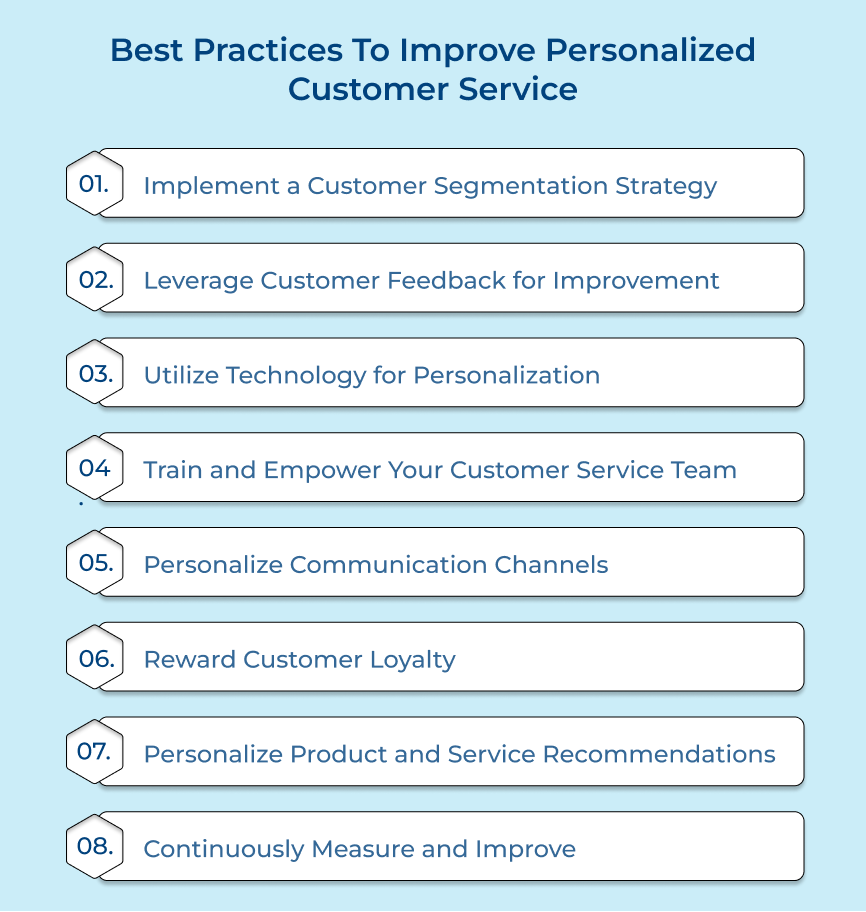
Segmenting your customer base allows you to group customers with similar traits, preferences and behaviors. The segmentation helps you better understand your customer segments and enables you to tailor your offerings to suit each group’s unique needs.
A clothing retailer may segment customers based on gender, age and style preferences to deliver personalized promotions. Implementing a customer segmentation strategy enhances the customer experience, boosts engagement and promotes loyalty.
Listening to customer feedback is vital for improving personalized customer service. Conducting surveys, encouraging online reviews and seeking feedback through various channels enables you to gather valuable insights into customer experiences. Analyzing feedback helps identify areas for improvement and adjust products, services, or processes accordingly.
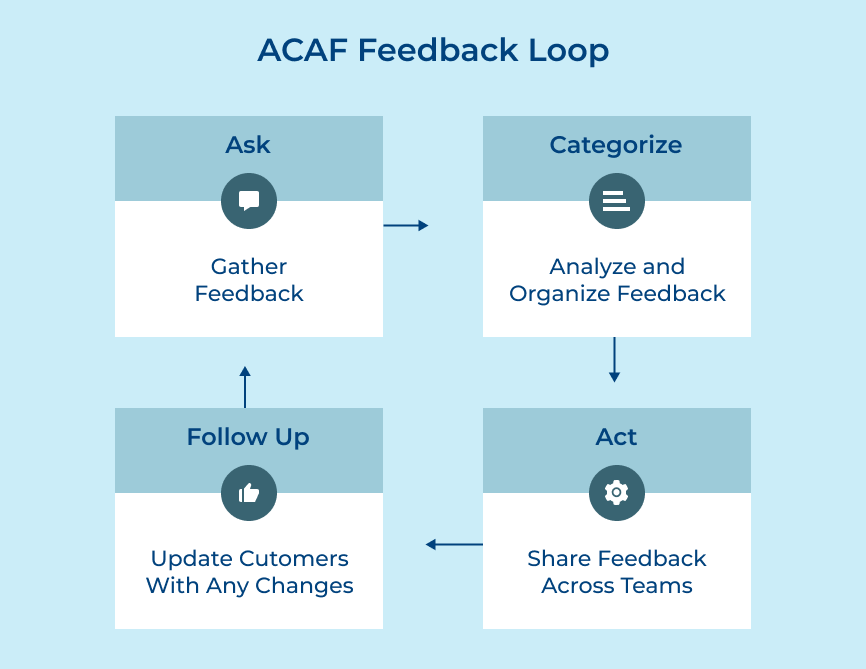
Let’s assume an e-commerce platform can collect feedback on website usability and make enhancements based on customer suggestions. Regularly implementing customer feedback demonstrates that you value their opinions and are committed to providing a better experience.
Companies must use technology to enhance their personalized customer service efforts. As 76% of consumers are likely to do business with a brand that uses personalization efforts, personalization in customer service is becoming increasingly crucial. AI-powered chatbots or virtual assistants can provide instant support and personalized customer recommendations, even outside business hours.
Personalizing the features on your website such as product recommendations based on customer browsing history or previous purchases, enhances the customer’s shopping experience and increases the likelihood of conversion. Leveraging email marketing tools enables you to deliver personalized content and offers tailored to individual customer preferences, creating a more engaging communication channel.
Training your customer service team is crucial for delivering personalized experiences. Equip your team with the knowledge, tools and resources to understand customer needs. Train them to develop active listening skills, empathy and problem-solving abilities to deliver exceptional service.
Encourage them to go the extra mile to exceed customer expectations and build lasting relationships. A well-trained and empowered customer service team is the backbone of personalized customer experiences. Reward exceptional customer service efforts to motivate and reinforce a customer-centric mindset within the team.
Different customers have varying communication preferences. Customers have varied communication preferences, such as email, phone calls, live chat, or social media. Identify and excel in their preferred channels so that your customer service team is proficient in all relevant channels.
A tech support company, for example, may offer assistance through phone calls, live chat and email. It will allow the customers to engage on their preferred channel while receiving the same level of personalized support. Adopting a multi-channel approach improves accessibility, responsiveness and customer satisfaction.
Reward your customers’ loyalty through programs that offer perks, like earning points for purchases and redeeming them for exclusive rewards. Offer exclusive discounts, early access to promotions, or personalized gifts as a token of appreciation for their ongoing support. Recognize and value your customers’ loyalty to strengthen the relationship and encourage ongoing support for your brand.
Assume there’s a grocery store that rewards customer loyalty through a program where shoppers earn points. The points can be redeemed for discounts on future purchases. It promotes loyalty and makes customers feel valued.
Use customer insights to personalize product and service recommendations. Past purchase history, browsing behavior and customer preferences can enable you to provide relevant suggestions that align with their needs.
Imagine there’s an e-commerce platform that uses machine learning algorithms to examine customer data. The collected data delivers personalized recommendations tailored to customers’ preferences. Anticipating the needs and offering tailored recommendations enables you to enhance the customer experience.
Companies must measure and analyze key metrics continuously to ensure the effectiveness of their personalized customer service efforts. Track customer satisfaction scores, retention rates, and lifetime value to gauge the impact of personalization on customer loyalty.
An online subscription service can measure customer churn rates and use that data to optimize personalized recommendations. Constant evaluation and enhancement of personalized customer service initiatives help you to stay ahead of customer expectations.
Below are some compelling examples of personalized customer service that not only meet expectations but exceed them, helping you to take notes on how to elevate your own customer service game.
1. Starbucks
Starbucks is known for its exceptional customer service and personalized experience for each customer. One example of this is when a regular customer at Starbucks mentioned to a barista that she was feeling under the weather. The next time she visited, the barista had her favourite tea waiting for her with a personalized note wishing her well.
The small gesture made a big impact on the customer, who felt cared for and appreciated by the brand. The customer then continued to visit Starbucks regularly and shared her positive experience. It eventually increased brand loyalty and word-of-mouth referrals.
2. Amazon
Amazon is a prime example of a company that excels in providing personalized customer service through its recommendation algorithms and customer support. One situation that showcases Amazon’s personalized service is when a customer contacted customer support with a question about a recent purchase.
The representative not only answered the customer’s question promptly but also recommended similar products that the customer might be interested in. The personalized recommendation not only solved the customer’s problem but also increased their satisfaction with the shopping experience.
3. Nordstrom
Nordstrom is known for its exceptional customer service, with personal stylists available to help customers find the perfect outfit or accessory. One example of Nordstrom’s personalized customer service is when a customer was shopping for a special occasion and couldn’t find the right dress.
A personal stylist at Nordstrom not only helped the customer find the perfect dress but also offered styling tips and recommendations based on the customer’s personal style preferences. The personalized service not only helped the customer feel confident and satisfied with their purchase but also strengthened their loyalty to the Nordstrom brand.
4. Netflix
Netflix provides personalized customer service through its recommendation algorithms and personalized content suggestions. One example is when a customer was unsure of what to watch and contacted customer support for recommendations.
The customer service representative not only suggested several TV shows and movies based on the customer’s viewing history but also offered to create a personalized watchlist for the customer to explore. The personalized recommendation not only helped the customer find new content to enjoy but also increased their engagement with the Netflix platform.
A data-driven approach to customer service empowers you to deliver the customer service that can gain you a huge competitive advantage. Using customer data, analyzing feedback, and utilizing technology enables businesses to tailor their support channels to meet individual customer needs.
The personalized approach empowers companies to build stronger customer relationships and boost customer satisfaction. Companies must learn to leverage the potential of personalization and utilize data-driven insights to create memorable interactions with their customers.
Data analytics and customer relationship management (CRM) systems allow businesses to gather valuable insights about their customers, enabling tailored interactions. Chatbots or AI-powered virtual assistants can provide immediate assistance, personalized recommendations and 24/7 support. Social media platforms and customer service software also facilitate real-time engagement, allowing businesses to respond individually to customer needs.
Investing in personalized customer interaction training enables your workforce to better understand and connect with customers, leading to better trust. Effective training equips them with the skills to anticipate customer needs, handle complex situations and provide personalized solutions. Employees can enhance customer satisfaction, boost brand reputation and generate repeat business by delivering exceptional service.
Initiate the process by developing a better idea about your customer base with the help of data analysis and market research. Segment your customers based on demographics, preferences, and behavior, allowing you to tailor your service accordingly. Train your employees to listen, empathize and personalize interactions actively. Leverage technology to track customer information and deliver customized experiences.
Personalization shows that a business recognizes individual needs and preferences, creating a stronger emotional connection. Addressing specific pain points and offering tailored solutions, personalized service enhances customer satisfaction. It also saves customers time and effort by providing relevant information.
Measuring the effectiveness of personalized service requires a combination of qualitative and quantitative methods. Start gathering customer feedback through surveys, interviews, or online reviews. Assess their satisfaction levels, likelihood to recommend and perceptions of personalization. Monitor key performance indicators (KPIs) such as customer retention rates, average order value and lifetime value.

Market better, sell faster and support smarter with Veemo’s Conversation Customer Engagement suite of products.
Unify all your customer data in one platform to deliver contextual responses. Get a 360 degree view of the customer lifecycle without switching tools.
Connect with the tools you love to reduce manual activities and sync your business workflows for a seamless experience.
 https://veemo.io/wp-content/uploads/2025/12/Evaluate-Customer-Service.png
1256
2400
indrasish5342@gmail.com
https://veemo.io/wp-content/uploads/2024/11/veemo.svg
indrasish5342@gmail.com2026-01-13 09:22:162025-12-24 09:26:44How to Evaluate Customer Service? The Complete Guide
https://veemo.io/wp-content/uploads/2025/12/Evaluate-Customer-Service.png
1256
2400
indrasish5342@gmail.com
https://veemo.io/wp-content/uploads/2024/11/veemo.svg
indrasish5342@gmail.com2026-01-13 09:22:162025-12-24 09:26:44How to Evaluate Customer Service? The Complete Guide https://veemo.io/wp-content/uploads/2025/12/After-sales-service.png
1257
2400
indrasish5342@gmail.com
https://veemo.io/wp-content/uploads/2024/11/veemo.svg
indrasish5342@gmail.com2025-12-30 09:29:092026-01-13 09:31:29After-sales Service Guide: Types, Examples & Tips
https://veemo.io/wp-content/uploads/2025/12/After-sales-service.png
1257
2400
indrasish5342@gmail.com
https://veemo.io/wp-content/uploads/2024/11/veemo.svg
indrasish5342@gmail.com2025-12-30 09:29:092026-01-13 09:31:29After-sales Service Guide: Types, Examples & Tips https://veemo.io/wp-content/uploads/2025/12/customer-attention.png
1256
2400
indrasish5342@gmail.com
https://veemo.io/wp-content/uploads/2024/11/veemo.svg
indrasish5342@gmail.com2025-12-26 10:31:002026-01-12 10:33:54What is Customer Attention? Strategies, Best Practices & Examples
https://veemo.io/wp-content/uploads/2025/12/customer-attention.png
1256
2400
indrasish5342@gmail.com
https://veemo.io/wp-content/uploads/2024/11/veemo.svg
indrasish5342@gmail.com2025-12-26 10:31:002026-01-12 10:33:54What is Customer Attention? Strategies, Best Practices & ExamplesGrow Customer Relationships and stronger team collaboration with our range of products across the Conversational Engagement Suite.

 6 Proven Ways to Build Customer Centric Culture Successfully
Scroll to top
6 Proven Ways to Build Customer Centric Culture Successfully
Scroll to top